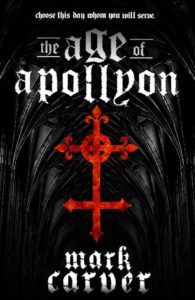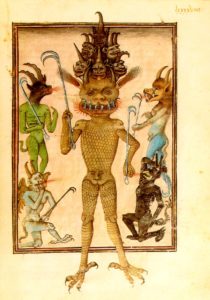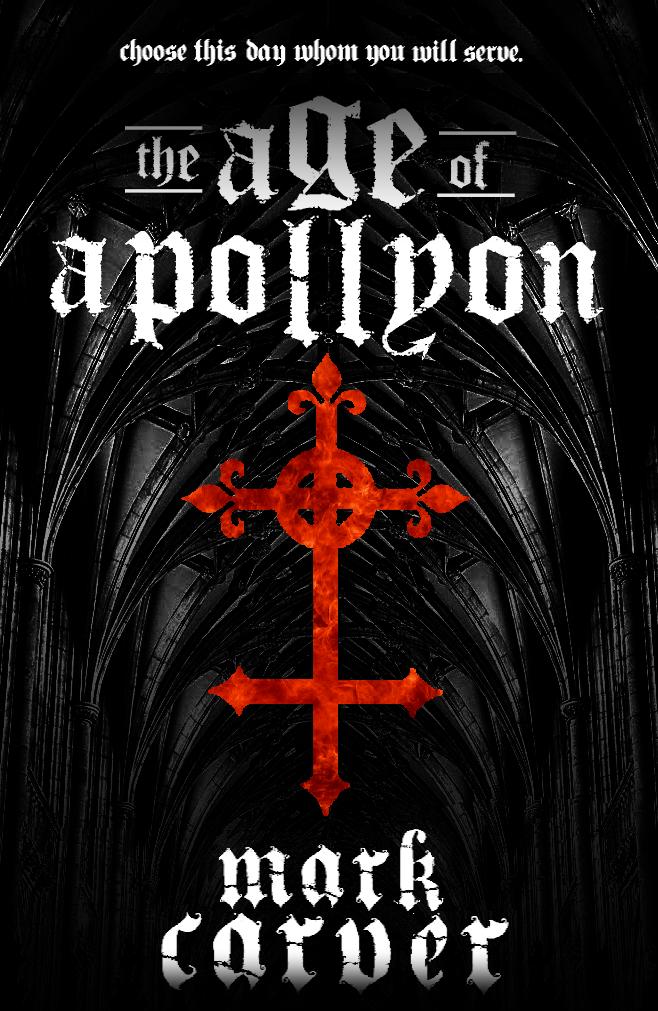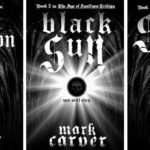Giving The Devil His Due
I began writing what would become my first published novel, The Age of Apollyon, the week of Halloween in 2011. In the months prior, I had become enchanted with Gothic architecture after reading The Hunchback of Notre Dame, my musical sustenance was a steady diet of symphonic heavy metal, and I made the snap decision to finally write the story that had been simmering in my imagination after watching Underworld for the 10th time.
The Age of Apollyon w as spawned from a very dark place. The story itself is an ultra-Gothic nightmare of cathedrals, graveyards, demons, and violence. The protagonist is actually a professing Satanist. I don’t know what exactly compelled me to write this grim tale and its sequels, but compelled is exactly what I was.
as spawned from a very dark place. The story itself is an ultra-Gothic nightmare of cathedrals, graveyards, demons, and violence. The protagonist is actually a professing Satanist. I don’t know what exactly compelled me to write this grim tale and its sequels, but compelled is exactly what I was.
And it freaked me out.
I admit that there has always been a seed of darkness in my imagination. I’m attracted to Gothic imagery and things that are traditionally labeled “dark” (wearing black clothes, tattoos, extreme metal music, Gothic novels, etc.). However, I am not, nor have I ever been, a “Goth,” and in fact I consider myself to be a very laid-back and positive person. But in the deep places of my mind lies a shadow, one that I know I cannot indulge.
That’s why I was so apprehensive about writing a story like The Age of Apollyon. I’ve never been an addict but I’ve seen the struggle firsthand and I know the reluctance to “go there,” especially if it has had a negative effect on your life in the past. Since my story would incorporate many Satanic and occult elements, real and fictional, I had to open the gates and let the ghost and ghouls run free.
But that wasn’t the hardest part. I also did a lot of research on various forms of Satanism and the occult. I combed through books like The Satanic Bible by Anton LaVey and The Book of the Law by Aleister Crowley. I examined symbols and images (who knows the difference between the sign of Baphomet and a simple pentagram?) and the names of demons, since in my story, Christian churches have been seized by the Church of Satan and renamed in honor of their infernal masters.
As I read and wrote, I was intrigued and repulsed at the same time. I felt a profound disturbance in my spirit, but I never felt convicted to stop writing. Despite the above description, the story is one of hope and redemption, and in order for the light to shine brightest, the darkness has to be pitch black. The Satanic world I created was certainly theatrical and infused with dramatic license, but I wanted the foundational truths to show through. Satan may disguise himself as an angel of light, but at his core, he is, to borrow Mickey Rourke’s descriptive phrase from The Expendables, “Dracula black.”
So I prayed. A lot. I’m not the kind of writer who gets too wrapped up in the emotions of the story that I’m writing (a “method writer”) but I could feel a shadow hovering over me as I wrote. I hope I did not bring any of that shadow into my relationships with my family and friends, and I was immensely relieved when I finished the trilogy two and a half years later.
I know my experience is not unique. Many writers go even further into darkness for their craft, often into subjects that are more grounded in reality, such as serial murder, rape, perversion, witchcraft, etc. Some have experienced them firsthand or interview people who have. I doubt they enjoy it, but as every writer knows, the story has to be told.
As I wrote, I made sure of one thing: the darkness I depicted was always portrayed as evil. I did not want to glorify Satan and his corruption, even though a large portion of my characters swore allegiance to him. But I also wanted to do this for myself. I wanted to convince myself once and for all that the light is indeed better than the darkness.
I know I’m going to “go there” again. The book I’m working on now is even more bleak, though from a historical perspective, and the book after that will go to the voodoo swamps of Louisiana. But having lived through The Age of Apollyon, I feel that I have better control over the shadows that slink and scurry through the caverns of my imagination. And darkness always flees before the light. John 1:5 reminds us: “The Light shines in the darkness, and the darkness did not comprehend it” (NASB).
If we venture into those dark places, we must always remember to keep the Light close.








































Wow. It’s tough to know how to comment! I read your other post about your books, just to get a fuller picture. Certainly I am glad that there are Christian authors tackling this stuff, although I confess to worrying about you in the writing of it….but I’m a mother. Worrying comes second nature. It seems like you have an understanding of the dangers of delving too deep into the darkness, which is good. I’m not sure I could read your books, though, I have a hard time with Satanic themes in books and movies. But that’s okay. I’m sure there is an audience for them, one that will be encouraged by these books. So keep hanging on to that Light and shining it in the corners, to the glory of God.
Lisa, what a great comment. I’ve had, and probably still do have, my reservations about the horror genre, too. I’ve read a few that don’t sound near as graphic as what Mark describes, and I finally had to stop picking up books like those. I felt too . . . affected . . . while I was reading them. The light at the end didn’t wash away all the stuff I’d endured to get there.
But I’ve come to a place where I can say, maybe some people need to be reminded of this darkness. I wouldn’t pretend to know what God wants to use and with whom He wants to use it. 😉
Becky
Hi Lisa, thanks for the encouragement. I know these kinds of stories aren’t for everyone, but my hope is that the people that do read them will have a greater awareness of the darkness in the world but will also take courage in the fact that the darkness can be, and has been, overcome.
It is hard for me to say much without having read the books, but it sounds like your overall goal is good :). I don’t write horror, but every now and then I think about some aspects of my story and worry about how other people(mainly my parents) would perceive and react to them, since some of my stories may be dark in terms of violence. Have you had to deal with something like that/how would you deal with that?
Well I wouldn’t say I’ve written any “horror” stories, just action books with horrific elements and themes, similar to movies like The Crow or Underworld. I was a bit apprehensive of what family and friends would think but I’ve had no negative reactions. In fact, I’ve had hardly any negative feedback about these books. I think the reasons are probably that not a large amount of people have read them 🙂 but also that I’ve succeeded in my goal of not glorifying or reveling in the dark/horrific elements in the story, as most horror books do. Authors often take sadistic pleasure in putting their protag through the wringer and after that, there is rarely a happy ending. In my books, and with all Christian horror, there should always be the hope of redemption. If the readers can recognize and be reassured by this, I think most can overlook things that may ordinarily creep them out.
Makes sense :). And maybe there’s an extent where we just have to deal with the fact that not everyone will like what we write. I know some people would not like to see a story with demons and angels in it at all, and I was a little worried about how my parents would react to my version of them, but so far they like the sound of my stories. Hopefully it will be the same for the way I handle violence, etc.
I tend to cringe a bit when people act like only certain genres can bring people closer to God. There should be limits of course, but I’ve seen shows like Fate Zero that were very dark but have done more for me than many other stories. Fate Zero is not Christian, but I felt it raised important questions and had a sense if hope and redemption to it for those who paid attention, much like you said a book should be.